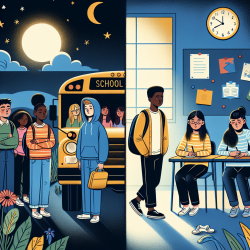Introduction
In recent years, the relationship between school start times and student well-being has garnered significant attention. The research article titled "The Relationship of School Start Times, Sleep Duration and Mental Health among a Representative Sample of High School Students in Colorado, 2019" provides valuable insights into this topic. This blog post aims to help practitioners improve their skills by implementing the outcomes of this research or encouraging further investigation.
Research Findings
The study utilized responses from 46,537 high school students in Colorado to explore the association between school start times, sleep duration, and mental health. Key findings include:
- Schools with start times of 8:30 a.m. or later had a higher proportion (32.2%) of students sleeping 8 hours or more compared to schools with very early start times (23.2%).
- For every 15-minute delay in school start time, students gained an additional 4.6 minutes of sleep.
- Students at schools with very early start times had higher odds of attempting suicide compared to those at schools with later start times.
Implications for Practitioners
These findings highlight the importance of considering school start times as a factor in adolescent sleep and mental health. Practitioners can leverage this data to advocate for policy changes that promote later start times, potentially improving student outcomes. Here are some steps practitioners can take:
- Advocate for Policy Change: Use the research findings to support initiatives for delaying school start times in your community.
- Monitor Student Sleep Patterns: Encourage parents and educators to track sleep duration and quality among students to identify those at risk of inadequate sleep.
- Provide Education: Educate students and parents about the benefits of adequate sleep and the impact of school start times on mental health.
Encouraging Further Research
While this study provides valuable insights, further research is needed to explore the long-term effects of delayed school start times on mental health outcomes, such as suicidal ideation and attempts. Practitioners are encouraged to collaborate with researchers to conduct longitudinal studies and expand the scope of investigation to different regions and demographics.
Conclusion
The research underscores the significant impact of school start times on adolescent sleep and mental health. By advocating for later start times and promoting awareness of the importance of sleep, practitioners can contribute to improved student well-being. To read the original research paper, please follow this link: The Relationship of School Start Times, Sleep Duration and Mental Health among a Representative Sample of High School Students in Colorado, 2019.










